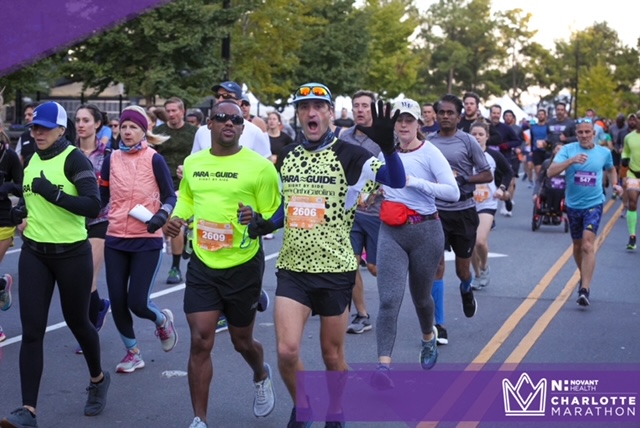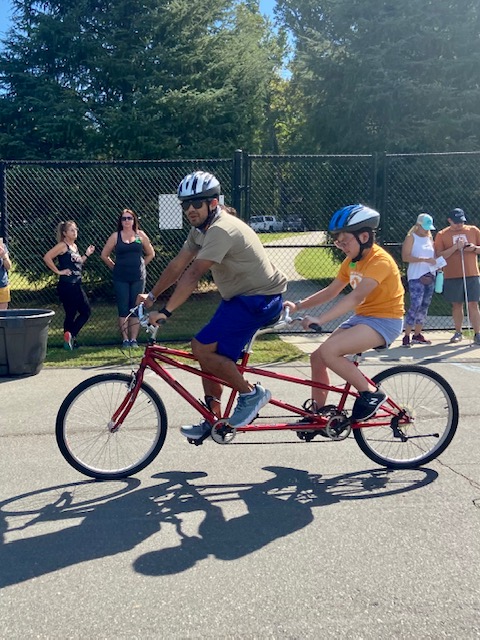Since 2017, this nonprofit has provided sighted guides and other support to blind and visually impaired athletes.

When Shannon Houlihan moved to Charlotte, North Carolina from Houston, she was surprised to discover there were no resources that supported blind athletes in triathlon and other similar sports.
Houlihan, an able-bodied triathlete, had become acquainted with several blind athletes in Houston, a city with several such groups.
Shortly after arriving in Charlotte, Houlihan met Paul Harrold, a fellow triathlete. When Houlihan expressed her amazement that a city with a large number of blind athletes had no resources or support, the two began discussing the idea of forming a nonprofit that would provide sighted guides for blind runners, cyclists, swimmers and others who needed assistance.
“Paul and I put our heads together to see what we could do, especially with regard to the tandem bicycles because they’re hard to come by,” explained Houlihan, a usat Certified coach. “Getting a guide and teaching someone how to run with a tether, that’s pretty accessible. There’s not a whole lot of cost. But a tandem bike or any bike costs a lot of money, not to mention maintenance, tubes, and tires.”
Para Guide was officially established in 2017, with Houlihan as executive director. She and Harrold immediately launched an aggressive fundraising campaign to purchase and fix up tandem bikes and ship them to athletes across the United States. They also recruited volunteers and hosted clinics for those interested in becoming a guide.
“We started out with five guides and now we’ve trained over 250 guides. We support over 100 blind athletes all over the U.S. and other places like the U.K. and Australia, which is pretty neat.”
Para Guide’s mission goes well beyond simply providing guides. Their mission is to pursue accessibility, inclusion and equity for blind athletes of all ages, races and backgrounds. Part of that focus is making sure athletes have the same access at events as their sighted peers.
When reaching out to race directors, Houlihan explains that a sighted guide is as essential as a prosthetic or wheelchair.
“It’s not an option, it’s a necessity. One of my favorite things to do is to help educate race directors. That’s something I do on a (regular) basis. I’m more than happy to do that because I think most of the time, people want to learn and do better. They want to make their events more accessible, but maybe they just haven’t been presented with that situation before.”
A common misconception Houlihan and Harrold encounter is a guide has to be capable of going at high speed. This is not the case at Para Guide.
“Because we support people of all paces, ages, speeds and ability, anyone can be a guide. Every time we go to one of these (clinics), people say, ‘I don’t know if I’m fast enough’. There’s a place for you. Everyone is fast enough.”
Guides are only one facet of the foundation’s services. Athletes are also provided with coaching and training plans to prepare them for events. Using a remote cycling system called Trainer Road, coaches can tailor workouts to an individual cyclist’s needs. The program, used over Wi-Fi, is accessible for blind users.

During the pandemic, Para Guide shipped fitness equipment so athletes could continue training and exercising at home without interruption.
“Everyone was stuck at home. They couldn’t go to their gym, outside with their tandem or pilot because of the pandemic. We started taking donated bikes and refurbishing them, cleaning them up a little bit and putting them on stationary trainers. We were able to do that for 50 blind and visually impaired individuals here in the Carolinas. That was huge.”
Transportation to and from events is another obstacle many blind athletes face. Para Guide minimizes that barrier by providing rides and transporting equipment in vans borrowed from a local storage company.
“A lot of our folks use public transportation like the train or bus system. But those are not always available. So we started using our guide and volunteer network to help pick people up, take them where they need to go, make sure they have what they need and get back to their homes.”
Para Guide serves people of all ages, including children. Services are provided free of charge to athletes. Everyone in the organization is a volunteer, including Houlihan and Harrold. Many of the donations and sponsorships have come from contacts in the triathlon space, and the response has been enthusiastic.
“Most of our sponsors were like, ‘that’s awesome; we want in’. That’s where we started, and then we applied for grants.”
Several of those grants have come from the Foreseeable Future Foundation. The funds are being used to conduct more guide clinics.
“We’ve really enjoyed having a relationship with Foreseeable Future since we began. Without the grants, we wouldn’t be able to do what we do. Running doesn’t cost a lot of money and doesn’t take up a lot of resources. But it costs money to put tubes and tires on bikes or fix a broken chain.”
Moving forward, Houlihan wants to increase awareness of Para Guide’s services and connect more blind athletes with guides. Being a part of their solution to get to a finish line at a race outweighs her own personal satisfaction as a triathlete.
“It’s very rewarding. There’s a lot of ways you can help your community. For me, being able to give back to the triathlon and running community is really where my passion is. Being able to share that with other people is hard to beat. It’s the best.”
